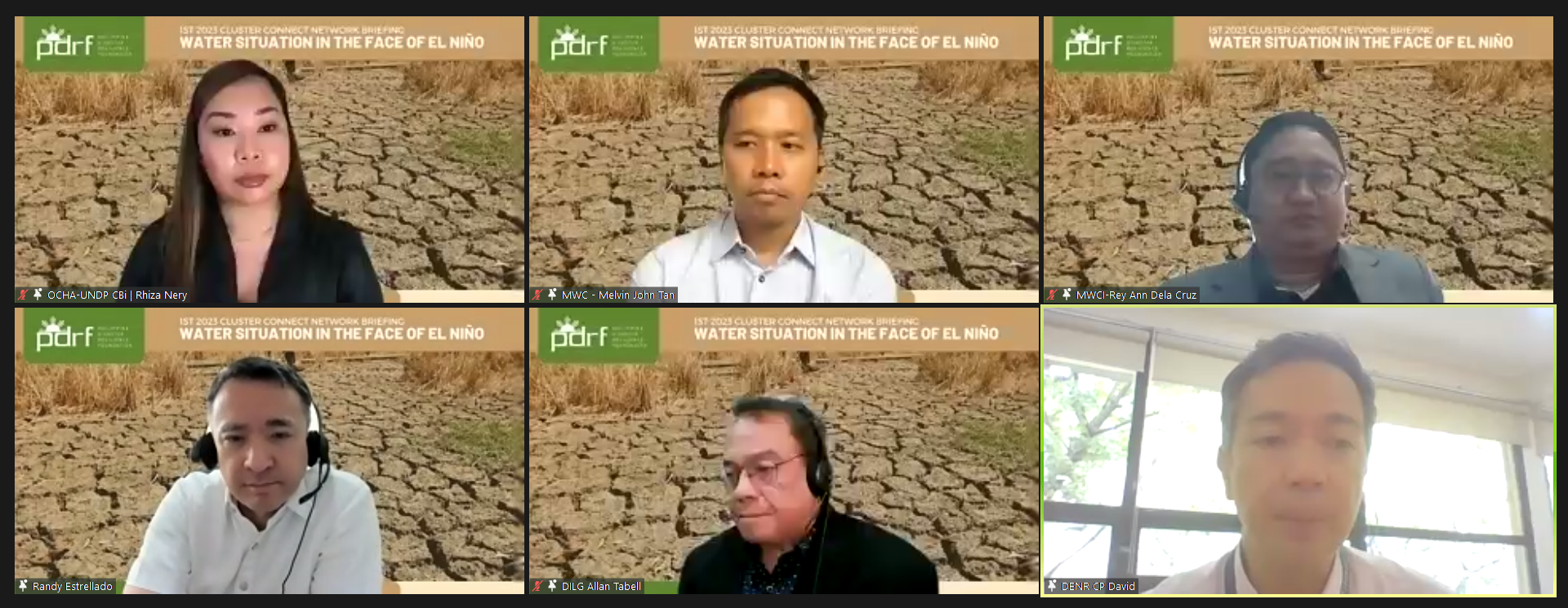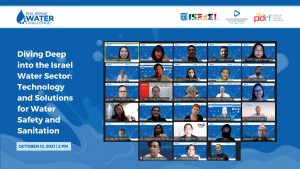The Philippine Disaster Resilience Foundation (PDRF) recently conducted a virtual briefing on El Niño with its member companies and partners to discuss how the private sector can prepare and mitigate the potential impacts of El Niño and ensure water security.
Attended by over 240 representatives from various organizations in the water sector such as Maynilad and Manila Water, government agencies such as the Department of the Interior and Local Government (DILG) and the Department of Environment and Natural Resources (DENR), United Nations agencies, Connecting Business initiative, USAID, and other international groups, the event was organized following the issuance of the El Niño Alert by the Department of Science and Technology-Philippine Atmospheric, Geophysical and Astronomical Services Administration (DOST-PAGASA).
According to DOST-PAGASA Senior Weather Specialist Remedios Cervio, El Niño will likely develop by May to July this year and last until the first quarter of 2024.
“El Niño increases the likelihood of below-normal rainfall conditions, which could bring negative impacts such as dry spells and droughts in some areas of the country. However, above-normal rainfall conditions during the Southwest monsoon season or Habagat may also be expected over the western part of the country,” Cervio said.
The impacts threaten the country’s critical lifeline utilities and livelihood, particularly in water supply and agriculture. With the looming episode of El Niño this year, several measures are already being implemented by different sectors to mitigate its effects.
The government revived the El Niño Task Force led by DILG to address significant areas of concern during El Niño. According to DILG Director Edgar Allan Tabell, the new task force will use protocol-based and long-term scientific processes and a whole-of-nation approach involving the private sector, non-government and civil society organizations, academe, and other stakeholders, which were absent from the previous teams’ strategies. “This time, it’s not just going to be the government. The government will lead, but we need the support of the entire country,” Tabell said.
Director Tabell also said the PDRF is part of the Strategy Management Unit of the proposed task force as the representative of the private sector since PDRF is already a member of the National Disaster Risk Reduction and Management Council.
More recently, the government also created the Water Resources Management Office (WRMO) under DENR. DENR Undersecretary Dr. Carlos Primo David explained that WRMO is mandated to solve conflicts among government water agencies.
“For Metro Manila, we wanted to jumpstart a water conservation program. The issue with water supply can also be solved by water demand. If we are able to decrease water demand, then it softens the blow of not having enough supply later on,” he added.
In preparation for El Niño, Usec. David also shared that DENR is working with the private sector and water districts. He said that the private sector could support the government in fixing pipe leaks that result in water wastage and bill increases.
The private sector also put measures in place to ensure an uninterrupted water supply and services 24/7. Manila Water Head of Water Supply Operation Rey Ann Dela Cruz and Maynilad Chief Operating Officer Randolph Estrellado shared that they are upgrading the capabilities of existing treatment plants and building more plants “in anticipation of lower [water] supply due to El Niño” and worst water quality.
“What keeps us up at night is the additional impact of climate change,” said Estrellado. “There’s still also some illegal logging in the areas surrounding the [La Mesa Dam] watershed. But because of climate change and typhoons, we’re getting more volumes of rain which tend to trigger soil erosion on the watersheds around Angat, particularly Ipo Dam.”
Moreover, Manila Water Chief Operating Officer Melvin John Tan emphasized the support needed by the private sector, especially by water utility companies, from the government to implement projects. “The Philippines is blessed with a lot of water sources. Maraming tubig [There is enough water]. But the key [here] is to develop small water resources. Ang kailangan natin ay magawa yung lahat ng [What we need is to finish all the] infra projects. And this is also where we need help from the government and the public to have patience,” said Tan.
PDRF encourages businesses to prepare for El Niño by managing water effectively, coordinating with the government and business partners, planning, and educating families, employees, and suppliers about El Niño and its impacts.
“Metro Manila has grown tremendously over the years, and yet its sources of water have not changed a great deal. So, any significant variation in the weather or any failure of equipment can lead to widespread interruptions. I hope that someday, our children will finally enjoy an adequate supply of clean running water,” said PDRF President Butch Meily.
PDRF will continue to monitor the situation and coordinate with its partners to guide and support our stakeholders in preparing and mitigating the impacts of this crisis.



